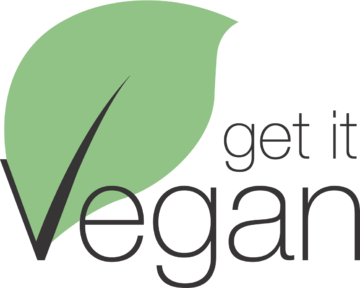Eyeshadow
Vegan and cruelty-free eyeshadow singles, palettes and more. Shop with confidence knowing that all of the eyeshadow, and all of the makeup products we list on Get it Vegan are 100% free of animal by-products, ingredients and testing.
Eyeshadow
What is ‘vegan’ & ‘cruelty-free’ eyeshadow?
The term “vegan”, with regard to eyeshadow, refers to eyeshadow that doesn’t contain ingredients that are derived or sourced from animals or insects, whereas the term “cruelty-free” refers to eyeshadow that's free of animal testing, including the individual ingredients used in it.
In other words, ‘cruelty-free’ refers to the safety of testing methods, while ‘vegan’ refers to the origin of the ingredients.
What animal and insect-derived ingredients are commonly used in eyeshadow?
While it certainly isn’t exhaustive, we’ve put together a list of some of the most common animal and insect-derived ingredients that are used in non-vegan cream eyeshadows, pressed mineral palettes, singles, and any other variety of eyeshadow.
We’ve also included the origins of these ingredients, the purposes that they’re used for in eyeshadow, and some of their animal-friendly alternatives. We’ve also included some of their aliases, because for some reason, you’re not likely to see “fish scales” or “crushed beetles” on an eyeshadow label.
Carmine: A red pigment that’s used in cosmetics to achieve certain colours, it’s obtained by crushing the female cochineal insect. Reportedly, around 70,000 female beetles must be killed to produce one pound of this red dye.
- Aliases: Cochineal; Carminic Acid.
- Vegan alternatives to carmine: Beet juice, alkanet root, synthetics dyes
Guanine: Used in eyeshadows to achieve a shimmery, luminous effect. It’s taken from fish scales and acids that are located in animal tissue.
- Aliases: Pearl Essence
- Vegan alternatives to guanine: Leguminous plants, synthetic pearl, fruit pigments, aluminum and bronze particles or mica - a natural shimmery mineral.
Honey: A saccharic secretion gathered and stored by honey bees. Essentially, it’s food for bees, made by bees. Used as a colouring agent and an emollient (provides creaminess and staying power) in certain eyeshadows.
- Aliases: Mel, Miel
- Vegan alternatives to honey: Plant-based colours and oils
Squalene: Typically derived from shark livers, it’s used in eyeshadows as a moisturizer, and for it’s reported anti-aging effects.
- Aliases: Shark Liver Oil; Squalane
- Vegan alternatives to squalene: Plant-based oils, most notably olive oil and palm oil
Hyaluronic Acid: Natural hyaluronic acid is typically derived from rooster combs. In cosmetics such as eyeshadow, it’s used primarily as a moisturizer, and much like squalene, for its reported anti-aging properties.
- Aliases: Acide Hyaluronan, Hyaluronate Sodium, Hylan, Sodium Hyaluronate.
- Vegan alternatives to hyaluronic acid: Synthetic hyaluronic acid and plant oils
What brands make vegan & cruelty-free eyeshadow?
The following brands make eyeshadow that’s full vegan and cruelty-free, in other words, completely animal-friendly!
- 100% Pure
- ADORN Cosmetics
- Au Natural Cosmetics
- Cate McNabb Cosmetics
- DeVita
- e.l.f. Cosmetics
- Elate Cosmetics
- Fairypants
- Gabriel Cosmetics
- ILIA Beauty
- INIKA
- LUXIE Beauty
Please Note: This is not an inclusive list, more and more cosmetics brands are switching over to animal-friendly formulations; we’ll update this list as we find and research them!
Is vegan & cruelty-free eyeshadow expensive?
In general, vegan and cruelty-free eyeshadow is not any more expensive, or any less-expensive, than eyeshadow that contains animal/insect derived or tested ingredients.
Just like “normal” versions, the prices of vegan & cruelty-free eyeshadow can vary based on differences in the quality and the availability of the ingredients used, differences in the manufacturing processes employed, different brand names behind them, as well as various other factors.
Why should I buy ‘vegan’ & ‘cruelty-free’ eyeshadow?
Who wants to smear fish scales or crushed beetles right above their eyes?? Aside from the ‘icky factor’, it’s important to buy eyeshadow that you know is vegan & cruelty-free because it’s a way to vote with your dollars, which creates demand for these products, reduces demand for non-vegan/non-cruelty-free products, and is thus a very effective form of animal-welfare activism!
Basically, if we as consumers stop paying companies to put these grotesque and cruelty-ridden ingredients in glitter eyeshadow, eyeshadow palettes, and other eyeshadow products, they will stop doing it.
How do you choose which eyeshadows to put in this store?
We maintain a growing list of companies that make eyeshadow that’s supposedly vegan-friendly and cruelty-free. We contact all of these companies to find out straight from them if they use animal and/or insect-derived ingredients, and to see if they abide by specific cruelty-free practices, including:
- Not testing their eyeshadows or ingredients on animals
- Not paying someone else to test ingredients or eyeshadows on animals for them
- Not purchasing ingredients from suppliers that test their ingredients on animals
- Not selling their products en masse to retailers in countries wherein animal testing is required by law, such as mainland China
When we find vegan eyeshadow that meets this set of cruelty-free criteria, and is sold on Amazon, we list it here for your shopping convenience.
Similar product categories
If you’ve found this page on vegan and cruelty-free eyeshadow helpful, check out similar product categories to learn or shop more:
For companies that make vegan & cruelty-free eyeshadow
If you make vegan and cruelty-free eyeshadow singles or palettes, or any other vegan/cruelty-free product for that matter, we’d love to feature you and your products on the “Brands We Love” section of our site! Contact us at - info(at)getitvegan(dot)com - to get started!
Sources
Some of the information for this guide on vegan & cruelty-free eyeshadow was gathered from the following sources:
- Living: “Animal-Derived Ingredients List.” (n.d.). PETA. Retrieved June 21, 2017. https://www.peta.org/living/other/animal-ingredients-list/
- Blog: “Are Your Cosmetics Vegan?” Kourtney Linebaugh (October 27, 2012). Gentle World. Retrieved June 21, 2017. http://gentleworld.org/are-your-cosmetics-vegan/
- Resources: “Watch Out For These Cruelty-Free Labelling Loopholes!” Vicky Ly (July 30, 2015). Gentle World. Retrieved June 21, 2017. http://ethicalelephant.com/cruelty-free-loopholes/
